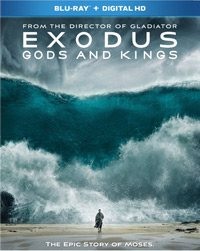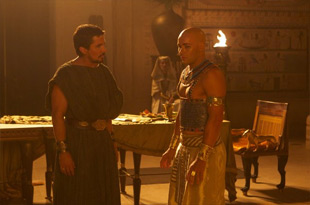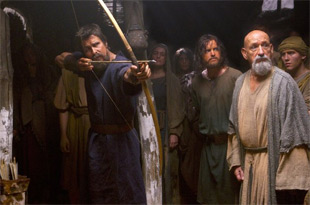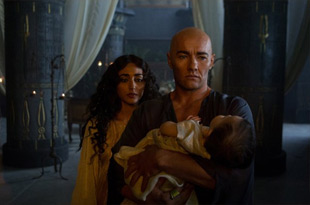
Exodus: Gods and Kings

 – for violence including battle sequences and intense images.
– for violence including battle sequences and intense images.
Director: Ridley Scott
Starring: Christian Bale, Joel Edgerton, Aaron Paul, Sigourney Weaver, Ben Kingsley, John Turturro, Ben Mendelsohn, María Valverde, Isaac Andrews, Golshifteh Farahani
Running Time: 2 hours, 30 minutes
Theatrical Release Date: December 12, 2014
Official Site
Discussion Guide (PDF)
Blu-Ray Release Date: March 17, 2015 (Amazon.com)

Plot Summary
Epic adventure Exodus: Gods and Kings is the story of one man’s daring courage to take on the might of an empire. Using state of the art visual effects and 3D immersion, Scott brings new life to the story of the defiant leader Moses as he rises up against the Egyptian Pharaoh Ramses, setting 600,000 slaves on a monumental journey of escape from Egypt and its terrifying cycle of deadly plagues. (Written by 20th Century Fox)
Film Review
It’s interesting to watch the ebb and flow of Hollywood trends. With the popularity of stuff like The Bible miniseries on TV (and now A.D.: The Bible Continues, its sequel miniseries) and Darren Aronofsky’s ridiculous take on Noah last year, it’s not really a big surprise that the story of Moses would be brought back to the big screen with a new adaptation, curiously titled Exodus: Gods and Kings (particularly the “Gods” part). Ridley Scott, the director behind films like Blade Runner, Alien, Prometheus and Black Hawk Down, takes on the story of Moses… with, you guessed it, a different interpretation of the Biblical story.
It’s tempting to immediately cry “miscast” at the idea of The Dark Knight trilogy’s Christian Bale stepping into the main character of the “slow of speech” Moses (Exodus 4:10). Bale’s a great actor, however, and pretty intense, so if anyone could handle the emotional weight of a story like that of Moses, it’d be Bale. But Scott and company take a wealth of liberties with the story. First of all, they make Moses completely unaware of his Hebrew heritage. Furthermore, he doesn’t believe in the “God of Abraham” and even scoffs at talk of him or customs. Moses is also something of a warrior here. He has combat experience and fight training, and he is often referred to as a general. I suppose, in Scott’s defense, the Bible glosses over his entire time as a member of Pharoah’s household before he kills the Egyptian guard mistreating a Hebrew slave in the texts, but there wasn’t ever any implication that he was a general of any kind. If anything, he was timid about speaking to Pharoah. In this film, too, Moses kills an Egyptian guard in the night after visiting the Hebrews in secret and being told he is of Hebrew descent. They mistake him as a slave and throw a rock at him, and he just immediately has a violent reaction of beating them up and stabbing one of them. It seems random and doesn’t hold the same weight of him having killed a guard who mistreated a slave.

Things continue to be dodgy as God appears to Moses through the burning bush, but then also in physical form as a little boy. In the commentary on the Blu-Ray from Ridley Scott, he uses the idea of God appearing through “an angel of the Lord” to use the little boy as a vessel of God, but it’s a bit ambiguous in the film, seeming more like the little boy IS God. The boy often seems callous and emotionless (and maybe even a little creepy), while Moses clearly holds anger and resentment towards God for the Hebrews being enslaved. What “God” wants him to do is made a bit ambiguous too, and when Moses attempts to return to Egypt to free the slaves, “God” kind of has this attitude like “I didn’t tell you to do what you’re doing, that’s why you’re failing. Now watch as I cause all these crazy plagues.” And instead of Moses warning Ramses that plagues are coming as a result of not obeying the God of Abraham to let His people go, they just kind of happen. And worse yet, they’re made to be somewhat practical. The water turning to blood is because of an unusual amount of crocodiles attacking and eating fishermen in the sea… which forces frogs onto land looking for clean water… who then die and attract gnats and flies, etc. Even the parting of the red sea isn’t Moses stretching his arms out to part the water, but more of the water receding to allow them to cross–much to the surprise of Moses. The sheer lack of faith and belief Moses has in God here is kind of unsettling. It’s downright strange to see Moses portrayed this way. And while things do have a relatively positive conclusion for Moses and his relationship with God, it starts to feel like the entire goal of Ridley Scott’s take on the story is to make Moses’s intentions seem pure, while he accuses God of not being loving or caring (and for allowing the Hebrews to be slaves in the first place). It almost feels like a theatrical commentary that exists to question how anyone could follow or trust in the God of the Jews, and ultimately, Christians. The characters of Moses and Ramses feel much more like modern day characters in period roles, rather than men of their time.
It’s unfortunate, too, because Bale is, as expected, great in the film. And Joel Edgerton is also strong as Ramses (even if the dialog doesn’t quite feel as period appropriate). Coupled with the beautiful cinematography and set pieces, Exodus: Gods and Kings has the look and feel of a fantastic production… which is what makes the inaccuracies and “artistic liberties” even more frustrating. Scott has the makings of a great Biblical epic here, but I can’t shake the feeling like there’s a hidden agenda behind his portrayal of God and Moses. Listening to his commentary a little bit was eye-opening, however. At one point, he does refer to the story as mythology and admits to not being sure if it’s true or not. That alone explains a lot. He also talks about trying to make it appeal to the various faiths that subscribe to the belief in Moses’ story. In the same commentary, screenwriter Jeffrey Caine comments that no one who believes in the literal interpretation of the Bible should be offended by this interpretation shown in the film, and later admits to wanting to change the whole idea of Moses turning the staff into a serpent into him being a general leading a guerilla army because it makes more sense. That kind of “artistic liberty” just seems like something someone who doesn’t really fully value the scriptures would make. With quite a few changes put in place, anyone unfamiliar with Moses’ story in the Bible will get a very skewed interpretation of it. Scott has downplayed the miraculous aspects of the story, which is also unfortunate and does a disservice to the beauty of the story and the faith that Moses exhibits to help free his people.

The content of the film is definitely an edgy PG-13. Most of it is violence with some bloody results, involving the battle scenes that Ramses and Moses lead the charge for early on, and some violence involving the slaves and the Egyptians fighting back the Hebrews with a barrage of arrows. There are also several scenes that show people being hung (and dropped while hanging so their necks break). The plague scenes are also really rough, especially the crocodiles eating fishermen out of their boats and the Nile turning blood red. And the sequence where the first born of Egypt’s lives are taken in their sleep is also quite intense and emotional. There’s no sexual content (although it’s hinted at when Moses spends the first night with his wife, but it’s tastefully done and inexplicit). Overall, the violent content makes the film definitely not one for the whole family.
Compared to Noah, Exodus: Gods and Kings fares far, far better, but ultimately, it suffers from similar
artistic liberties that were taken with the origins of the story. Things that just did not need to be messed with — like Moses’ knowledge of his heritage and his faith in God — are toyed with here too much. It’s a pretty good movie apart from that, but taking Biblical truths into consideration, Exodus: Gods and Kings is not the best representation of Moses or his story. For that, one would probably be better off watching Charlton Heston’s The Ten Commandments instead. However, if you still end up watching Exodus: Gods and Kings, use it as an opportunity to revisit the book of Exodus in the Bible and make sure you know what appears to be significantly different from the Bible’s pages.
– John DiBiase, (reviewed: 4/4/15)
Blu-Ray Special Features Review
It’s a little surprising how thin on extras the Blu-Ray release of Exodus: Gods and Kings is. The film looks fantastic in HD, and is definitely one to watch in high definition, but don’t expect the bonus features to delve too deeply into the making of the film (aside from a director’s audio commentary).
The Exodus Historical Guide is a pop-up anecdote feature you can turn on and off while watching the movie. It relates historical facts regarding Moses’ story and also cross-references beliefs between different religions — from Christianity to Islam, etc. Some of the pop-ups even quote and reference scripture.
Deleted and Extended Scenes (14:57) – There are 10 deleted or extended scenes with a Play All option.
“Tuya Confronts Ramses” is the first scene and it shows Sigourney Weaver’s Tuya approaching Ramses while he’s being given a massage and he’s wearing basically a thong (so we see the side of his bare butt cheeks and the small cloth covering his front). In the scene, she tells him he should kill Moses. “Moses Waits for the Viceroy” shows Moses at the viceroy’s palace waiting around to see him and actually nodding off in a chair from waiting so long. When they eventually talk, Moses doesn’t hide his irritation about this. “Moses Sees the Burning Bodies” is an extended version of the scene in the film. Here, he talks to one of the Egyptian guards and asks why they do this at night. The guard explains it’s because of the smell and that people are upset by the act being done during the day. When Moses asks how many die per day, the guard says it’s about 100 slaves. “Ramses Makes Moses Chief Advisor” shows Ramses and Moses candidly talking. There’s a big green screen backdrop during this encounter for the unfinished special effects. “Zipporah and Gershom Discuss God’s Mountain” is just Zipporah talking with Gershom who matter-of-factly mentions that Moses doesn’t share their faith in God and this upsets Zipporah. “Snake Hunt and Aftermath” is the longest deleted scene and it shows Moses and his followers planning to capture Ramses while he’s on a hunt for snakes. Moses confronts him but he escapes. There’s actually a miracle in this scene where God protects Moses, to which he later thanks God, but the whole sequence was cut out. It actually probably would have been a good sequence to leave in. “Moses Touches His Sword to the Nile” is an extended scene as well, and in it, God tells him to touch his sword to the Nile to initiate the plagues. This also should have been left in (and it features a large blue screen backdrop which is distracting, but it’s due to the scene being unfinished). “First Boil on Nefertari” is a little snippet of a scene where Tuya discovers a boil on Nefertari’s lip while they’re at dinner with Ramses. Finally, “Bad Behavior” shows the Hebrews partying with their golden calf and dancing seductively with each other (one short moment shows a guy groping a woman and a little bit of her “skin” briefly becoming visible while they dance). It’s showing more of why God gave Moses the Ten Commandments.
Commentary by Ridley Scott and Jeffrey Caine – This is feature-length commentary where Ridley talks about the production and the interpretations of the Biblical story, while story explanations by screenwriter Jeffrey Caine are spliced in with Ridley’s comments to add a little more insight.
– John DiBiase, (reviewed: 4/4/15)
Parental Guide: Content Summary
![]() Sex/Nudity: Some of the womens’ Egyptian garbs show significant cleavage; On Moses and Zipporah’s wedding night, Moses undoes the front tie of his wife’s tunic around her neck and kisses her. The scene ends there; We briefly see a woman’s bare back as they peel away bloody gauze
Sex/Nudity: Some of the womens’ Egyptian garbs show significant cleavage; On Moses and Zipporah’s wedding night, Moses undoes the front tie of his wife’s tunic around her neck and kisses her. The scene ends there; We briefly see a woman’s bare back as they peel away bloody gauze
![]() Vulgarity/Language: None.
Vulgarity/Language: None.
![]() Alcohol/Drugs: There might be some wine drinking, but it isn’t focused upon much.
Alcohol/Drugs: There might be some wine drinking, but it isn’t focused upon much.
![]() Blood/Gore: We see a dead bird get cut open so that a prophet can take out its entrails and make a prediciton. We see a some blood, as well as some dripping into cup; During a big battle, we see swords slicing at people with some blood spraying. We also see blood on swords. Ramses has some blood sprayed on his face while Moses has a bloody cut on his face and some abrasions on his elbows; We see a slave being whipped and their bloody back. We then see another one in passing with bloody scars on his back from having previously been whipped; We later see the same slave with blood on his face; We see a bowl of blood being poured out and then see leeches on the Pharoah’s skin and some blood around them; Moses has some abrasions on his face; Moses’ horse collapses and we soon see it lying on the ground looking dried up; We see Moses roasting a skinned rabbit over a fire; We see Moses’ bloody leg in a splint and an abrasion on his shoulder; Moses happens upon piles of slaves being burned at night; As part of the plagues, lots and lots of crocodiles attack boats and eat lots of people, causing the water to turn red. We then see lots of dead fish floating in red water; We see maggots eating dead frogs and flies and gnats covering animal carcasses; We see lots of boils and sores on people’s bodies. We briefly see a woman’s bare back as they peel away bloody gauze; We see a message written in blood on the side of horse; A horse falls over and Ramses touches it to find blood on his hand; An ox spews blood from its nose and collapses; We see the Hebrews collecting lambs’ blood and smearing it on their doors; Moses has blood on his head and back; We briefly see sharks attack body in the water with blood around it.
Blood/Gore: We see a dead bird get cut open so that a prophet can take out its entrails and make a prediciton. We see a some blood, as well as some dripping into cup; During a big battle, we see swords slicing at people with some blood spraying. We also see blood on swords. Ramses has some blood sprayed on his face while Moses has a bloody cut on his face and some abrasions on his elbows; We see a slave being whipped and their bloody back. We then see another one in passing with bloody scars on his back from having previously been whipped; We later see the same slave with blood on his face; We see a bowl of blood being poured out and then see leeches on the Pharoah’s skin and some blood around them; Moses has some abrasions on his face; Moses’ horse collapses and we soon see it lying on the ground looking dried up; We see Moses roasting a skinned rabbit over a fire; We see Moses’ bloody leg in a splint and an abrasion on his shoulder; Moses happens upon piles of slaves being burned at night; As part of the plagues, lots and lots of crocodiles attack boats and eat lots of people, causing the water to turn red. We then see lots of dead fish floating in red water; We see maggots eating dead frogs and flies and gnats covering animal carcasses; We see lots of boils and sores on people’s bodies. We briefly see a woman’s bare back as they peel away bloody gauze; We see a message written in blood on the side of horse; A horse falls over and Ramses touches it to find blood on his hand; An ox spews blood from its nose and collapses; We see the Hebrews collecting lambs’ blood and smearing it on their doors; Moses has blood on his head and back; We briefly see sharks attack body in the water with blood around it.
![]() Violence: A dead bird is cut open by a prophet of sorts; There’s a big battle early on involving two armies fighting with lots of arrows being shot with soldiers being shown falling, as well as horses. We see some sword fighting and blood spraying too. In one instance, a man is impaled by a spear. It’s a very violent sequence; We see lots and lots of Hebrew slaves working in a mine or something; We see a slave being whipped and their bloody back. We then see another one in passing with bloody scars on his back from having previously been whipped; A guard throws a rock at Moses and he turns around and fights them, including stabbing one in the abdomen, killing them; Ramses grabs Miriam’s face roughly and then goes to cut her arm off but Moses stops him with his blade; Moses’ horse collapses and we soon see it lying on the ground looking dried up. Two men come to attack him, so he fights and stabs them. His finishing move is stabbing both men at once with his sword; A rock slide knocks Moses off his feet and covers him in mud. While he’s trapped in the mud, a nearby bush catches on fire but doesn’t burn; Moses happens upon piles of slaves being burned at night; The Egyptians search for Moses and ransack many of their homes, beating the slaves and attacking some in the process; We see a man and his family hung at the gallows. We then see more hangings, with them being dropped and their necks snapped, and then we see some hanging afterwards. All of it is quick, but still jarring; Meanwhile, we see scenes of Moses training the Hebrews to fight with bows and arrows; We see some people light fires that cause an explosion; The Hebrews shoot flaming arrows at many ships, which catch on fire. We see people on fire falling into the water; As part of the plagues, lots and lots of crocodiles attack boats and eat lots of people, causing the water to turn red. We then see lots of dead fish floating in red water; We see slaves working and being whipped; A horse falls over and Ramses touches it to find blood on his hand;
Violence: A dead bird is cut open by a prophet of sorts; There’s a big battle early on involving two armies fighting with lots of arrows being shot with soldiers being shown falling, as well as horses. We see some sword fighting and blood spraying too. In one instance, a man is impaled by a spear. It’s a very violent sequence; We see lots and lots of Hebrew slaves working in a mine or something; We see a slave being whipped and their bloody back. We then see another one in passing with bloody scars on his back from having previously been whipped; A guard throws a rock at Moses and he turns around and fights them, including stabbing one in the abdomen, killing them; Ramses grabs Miriam’s face roughly and then goes to cut her arm off but Moses stops him with his blade; Moses’ horse collapses and we soon see it lying on the ground looking dried up. Two men come to attack him, so he fights and stabs them. His finishing move is stabbing both men at once with his sword; A rock slide knocks Moses off his feet and covers him in mud. While he’s trapped in the mud, a nearby bush catches on fire but doesn’t burn; Moses happens upon piles of slaves being burned at night; The Egyptians search for Moses and ransack many of their homes, beating the slaves and attacking some in the process; We see a man and his family hung at the gallows. We then see more hangings, with them being dropped and their necks snapped, and then we see some hanging afterwards. All of it is quick, but still jarring; Meanwhile, we see scenes of Moses training the Hebrews to fight with bows and arrows; We see some people light fires that cause an explosion; The Hebrews shoot flaming arrows at many ships, which catch on fire. We see people on fire falling into the water; As part of the plagues, lots and lots of crocodiles attack boats and eat lots of people, causing the water to turn red. We then see lots of dead fish floating in red water; We see slaves working and being whipped; A horse falls over and Ramses touches it to find blood on his hand;
An ox spews blood from its nose and collapses. They burn dead animals; We see two more brief hangings; We see a huge hail storm pelt Egypt with many things breaking and shattering; We see lots of locusts eating things; The Egyptians shoot and kill many Hebrews with arrows; A blackness passes over the city, taking lives. We see many children breathing and then suddenly go still (having died); A man falls off his chariot and is trampled to death; Many men and chariots fall off the side of a cliff that starts to collapse; Ramses punches a chariot driver off of his chariot; A huge wave of water takes out a running horse; Waves take out chariots with men and horses; Moses and Ramses’ chariots are wiped out by the waves. We then see many bodies floating in and under the water, dead; A man swept underwater hits a rock; We briefly see sharks attack a body in the water with blood around it.
